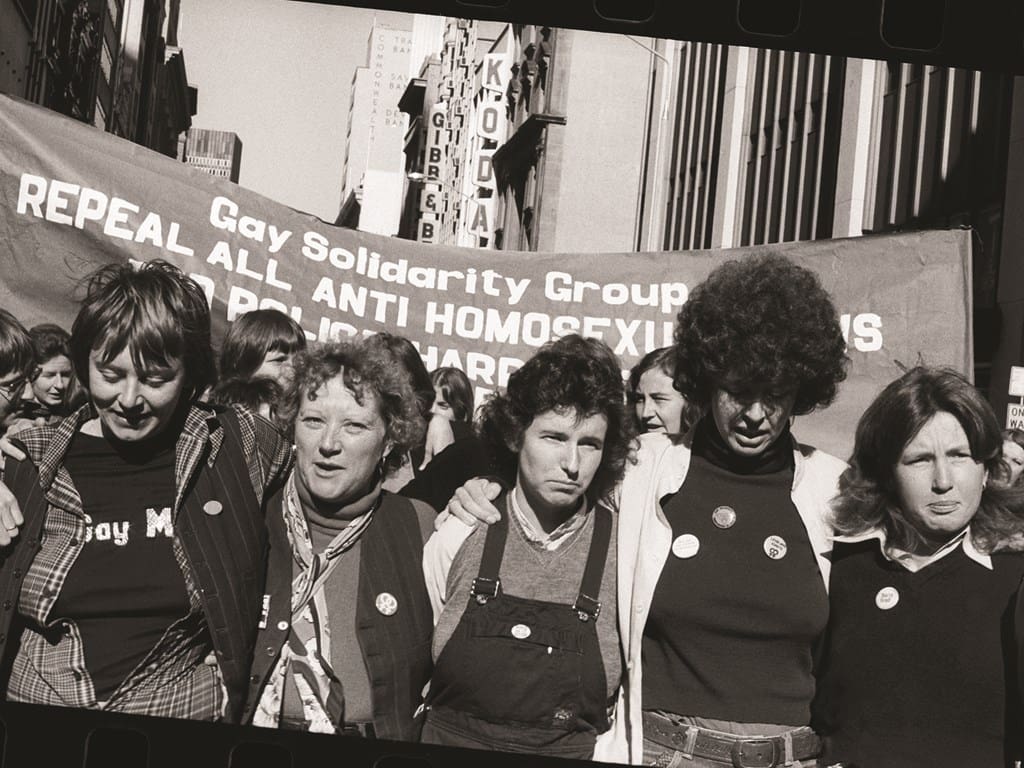The Campaign Against Moral Persecution (CAMP) may have been the most prominent queer activist organisation in Australia’s history; but it was not the first. The Daughters of Bilinits, the Australian chapter of an American lesbian group, formed in Sydney two years earlier. Fortunately, Elias Jamieson Brown’s CAMP recognises this in its opening minutes. Its decision to do so is reflective of the production’s attention to historical detail and its elevation of CAMP’s female members’ stories; the product of which was a play that effectively displayed the activism, queer joy and pain involved with CAMP’s queer organising.
CAMP tracks the Campaign Against Moral Persecution’s activism in a series of historical snapshots, framed by the experience of its members. Fitting for a play held at the University of Sydney’s Seymour Centre, CAMP’s journey through queer history starts with the thrill of (fictional) CAMP co-founders Dave (Adriano Capelletta) and Krissy (Anni Finsterer) involved in the crippling of a police car on USyd campus in 1969. What follows is a fly through of CAMP’s first protest — the first queer protest in Australian history — outside Liberal Party headquarters, the murder of Dr George Duncan in Adelaide, and the first Mardi Gras in 1978.
This historical detail was well complemented by CAMP’s consideration of the politics involved in CAMP, and the gripes of its members. From careful use of CAMP’s Phone-A-Friend service to exploring the degree to which CAMP was, and ought to have been, an activist or social organisation — more subtle forms of CAMP’s history were interrogated.
Giving these events emotional poignancy are the stories of CAMP’s co-founders, and the relationships of Jo, a mother denied custody of her child for being gay, and Tracey, who is reeling from her severe mistreatment at Chelmsford psychiatric hospital. Tamara Natt and Lou McInnes give strong performances in the roles of Jo and Tracey respectively; performances which were indicative of the quality of the cast more generally.
CAMP’s transitions and montages — including protest scenes and scenes at lesbian bar Ruby Reds — injected the play with a liveliness and activist anger that would have otherwise escaped a simple historical retelling of CAMP’s history. Movement director Emily Ayoub worked well with the cast to enable the strong physical performances which animated these moments.
CAMP’s stage (Angelina Meany), comprising of a wooden platform and scattered chairs and tables, and use of archival material – from radio snippets to television recordings of Mari Gras – also provided subtle touches of the grunginess of queer activism in the 1970s, grounding the narrative and performances well. The set in particular was dynamic and functional.
Although absent of a central plot point (content instead to revolve around a number of smaller plots) CAMP grounded itself through a fast-forward to the present day, where older representations of Tracey, Jo and Krissy reunite to write about their experiences in CAMP. This channelled the nostalgia inherent in the play, and provided the opportunity to be self-referential, in a context in which the activist credentials of Sydney World Pride are routinely questioned in the queer community.
CAMP was in sum a strong production, with neither the writing, production nor performances evidently in need of improvement. It was a treat to see Australia’s queer history evoked on stage and left me feeling optimistic and grateful, emotions historically denied to queer people by artistic representations of queerness.





